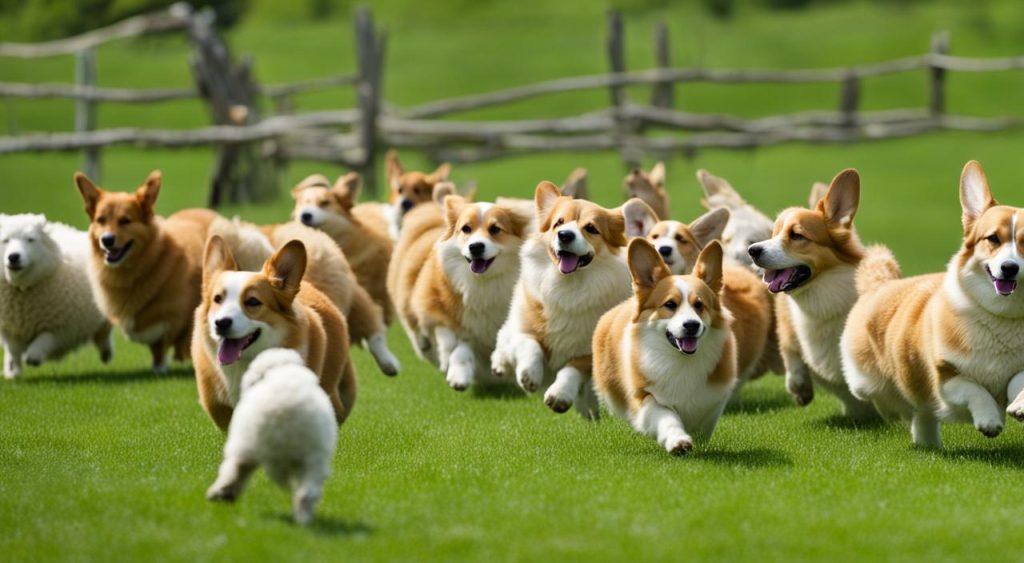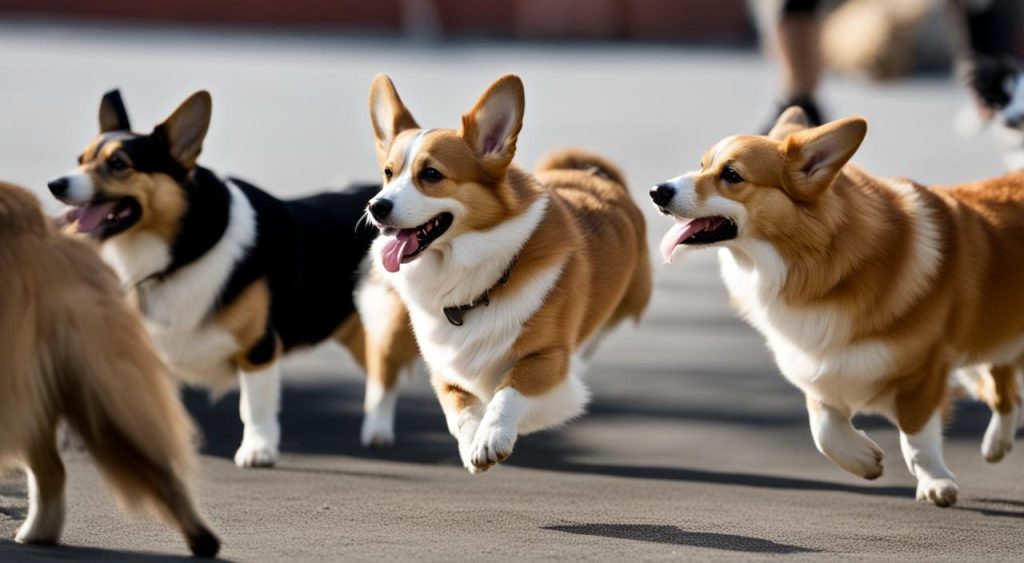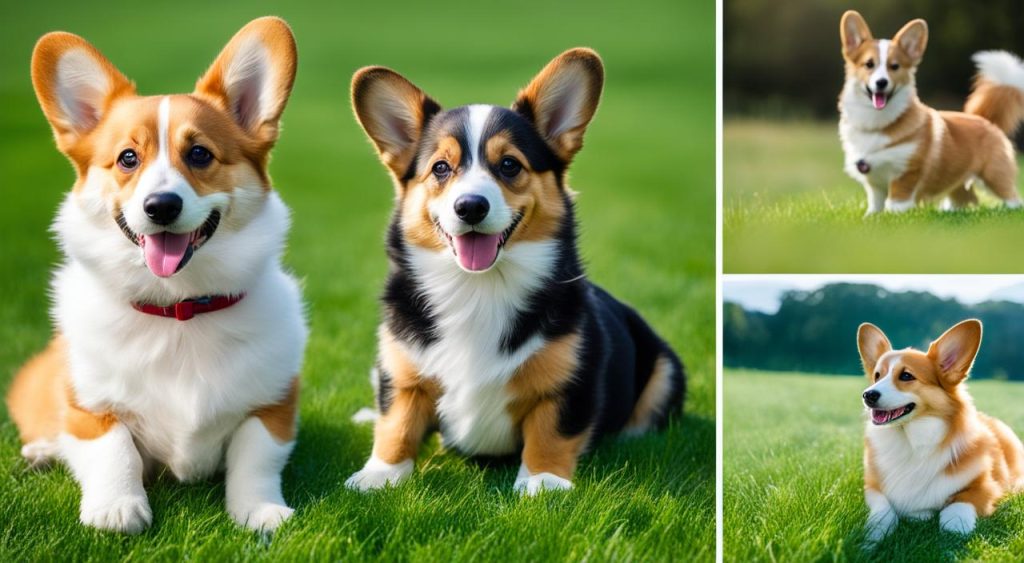Corgis, with their adorable appearance and iconic stubby legs, are more than just cute companions. These lively and active dogs have a rich history of herding livestock, showcasing their remarkable skills and talents. Despite their small size, corgis possess a unique expertise that sets them apart from other breeds. Let’s explore the remarkable traits and specialties that make corgis truly exceptional.
Key Takeaways:
- Corgis have a herding history, making them skilled in managing livestock.
- They may be small in size, but their energy levels and activity make them exceptional.
- The Pembroke Welsh Corgi, famously loved by The Queen, displays outstanding dedication to their owners.
- Corgis come in various colors and have a medium-sized, soft coat with a dense undercoat.
- The average Corgi has a lifespan of 12-15 years and an average size of 25-35 cm and weight of 9-12 kg.
Exercise and Temperament of Corgis
Corgis, with their adorable appearance and lively personalities, require a well-rounded exercise routine to keep them happy and healthy. Meeting their exercise needs is essential to ensure they maintain their optimal physical and mental well-being.
As natural herding dogs, corgis have a history of being active and energetic. To cater to their exercise requirements, it is recommended to provide them with at least 1 hour of exercise per day. This includes activities that stimulate them mentally, such as puzzle toys or training sessions. Engaging in physical and mental activities helps to prevent boredom and reduces the likelihood of them becoming destructive.
One of the favorite activities for corgis is going on winding walks in the countryside, where they can explore new environments and engage their curious nature. It is important to note that corgis have a tendency to chase due to their herding instincts, so it is crucial to keep them on a leash or in a securely fenced area to ensure their safety.
Corgis are intelligent and independent thinkers, traits that can make training a rewarding yet challenging experience. Patient and consistent training methods are key to effectively communicating with your corgi and establishing boundaries. Positive reinforcement techniques, such as treats and praise, are highly effective in motivating and encouraging desired behaviors.
“Training a corgi requires patience and consistency. Remember to use positive reinforcement techniques to motivate them and make the training process enjoyable for both of you.”
In addition to their exercise needs, corgis are naturally sociable dogs that generally get along well with children and other pets. Their high sociability level makes them great companions for families. However, it is important to supervise interactions between corgis and small children, as their herding instincts may cause them to nip at ankles. Proper socialization from an early age can help mitigate this behavior.
With their alert nature, corgis make good guard dogs and are often vocal, barking at guests and potentially deterring intruders. This is a characteristic that can be managed through training and socialization.
While corgis do prefer to have some outside space to freely roam and explore, they can adapt to apartment living as long as they receive adequate exercise and mental stimulation. Regular walks, playtime, and engaging activities not only meet their physical needs but also prevent boredom and help maintain a healthy balance of energy.
Corgis’ Intelligence, Size, and Health
Corgis are widely recognized for their remarkable intelligence. In fact, they are ranked 11 among the most intelligent dog breeds. This means they possess exceptional learning abilities and are quick to pick up new commands and tricks. Alongside their impressive mental capabilities, corgis are also adored for their adorable appearance, characterized by their giant ears and short legs.
Despite their pint-sized stature, corgis boast a robust body with heavy bone structure, earning them the title of “big dog on short legs.” Their manageable size, averaging 25-35 cm and weighing 9-12 kg, makes them a practical choice for individuals and families looking for a compact yet sturdy companion.
When it comes to grooming, corgis have relatively easy-care coats. They sport a short fur that sheds moderately, particularly during the spring and autumn seasons. To maintain the coat’s condition, regular brushing a few times a week is necessary. This helps to minimize shedding and keeps their coat looking its best.
In terms of health, corgis have specific vulnerabilities that deserve attention. It is crucial to pay close attention to their well-being and schedule routine health check-ups with a trusted veterinarian. By staying proactive, potential health issues can be identified early on and necessary measures can be taken to ensure your corgi’s quality of life.
To fuel their energy and maintain overall health, corgis require a balanced diet. Their dietary requirements include the right proportions of nutrients, vitamins, and minerals. Providing them with a wholesome and nourishing meal plan is essential for their well-being.
Corgis are not only intelligent and health-conscious but also make excellent social companions. With their charming appearance, they effortlessly attract attention in public, making it easier to strike up conversations and meet new people. However, it’s important to note that corgis can exhibit territorial behavior towards unknown dogs and cats, requiring proper socialization and training.
In summary, to ensure a happy and well-behaved corgi, consistent training, mental stimulation, and regular exercise are key. By tending to their intelligence, size, and health needs, you can provide your corgi with a fulfilling and enriched life.





